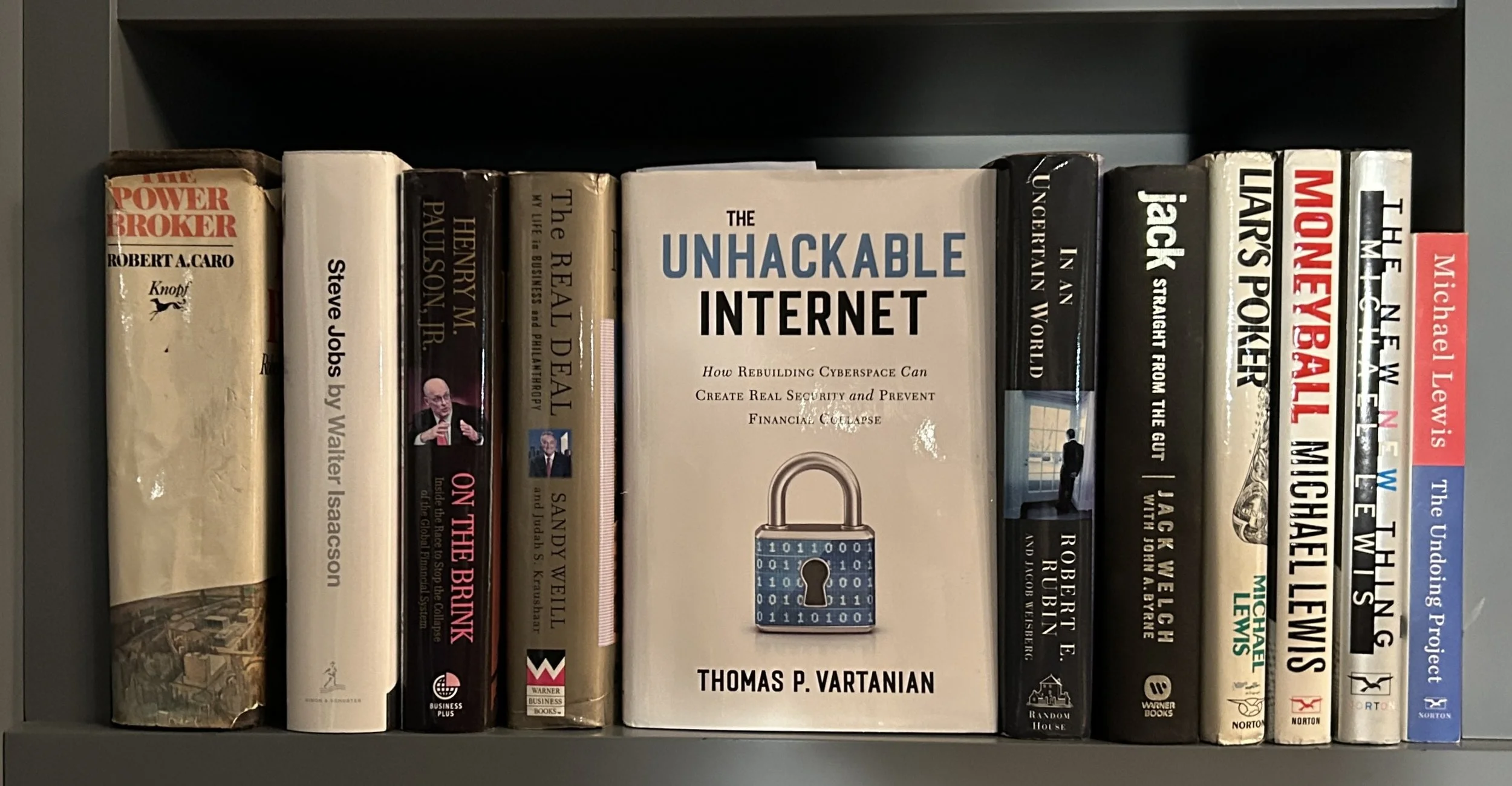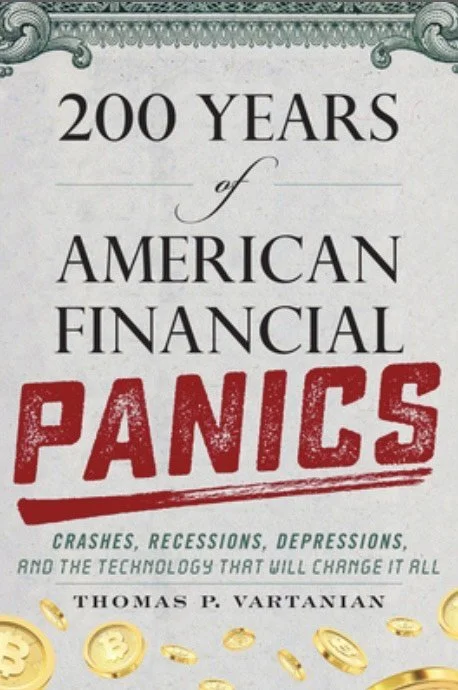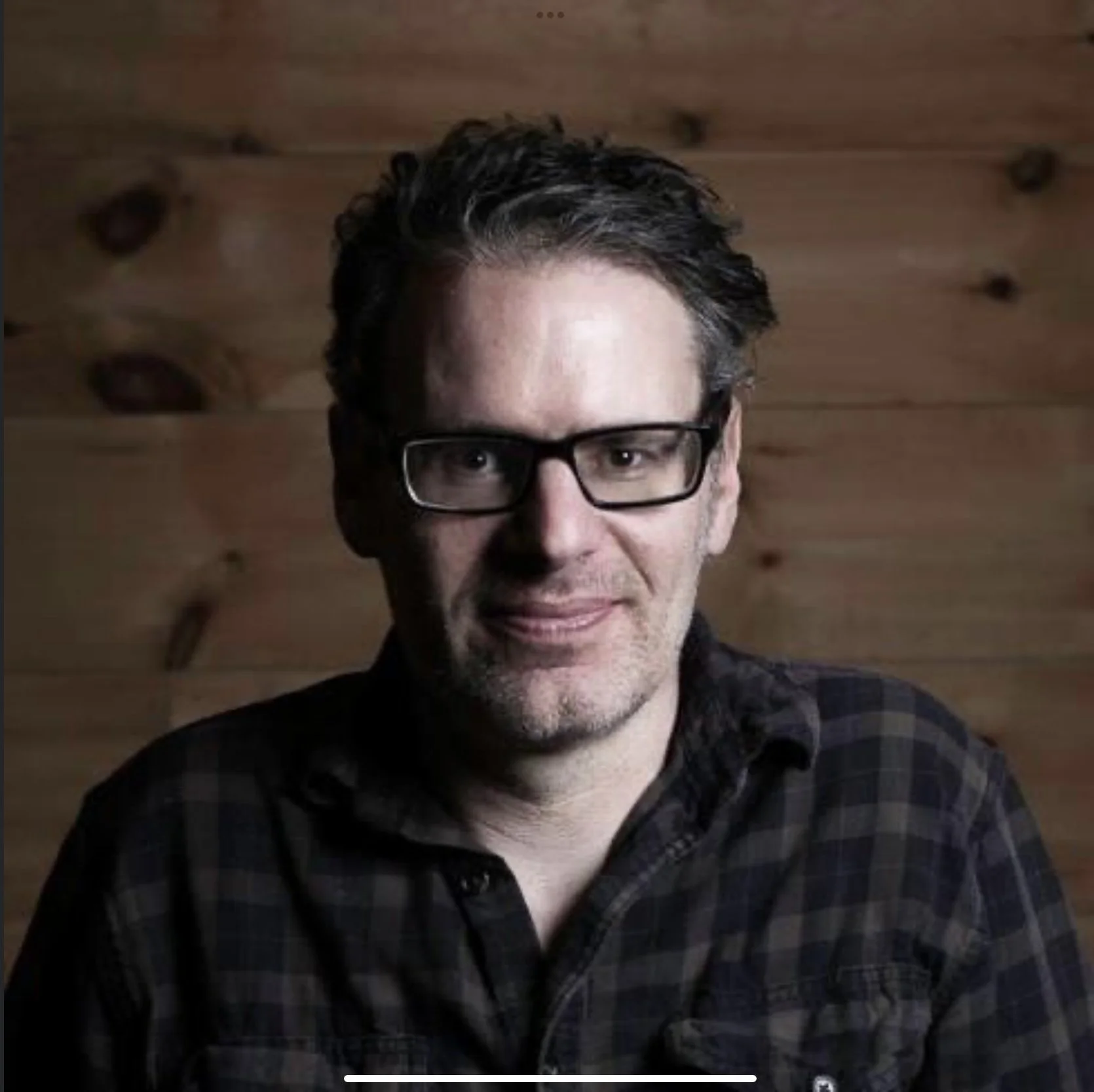Tell Me What You're Reading No. 43: Tom Vartanian - The Unhackable Internet: How Rebuilding Cyberspace Can Build Real Security and Prevent Financial Collapse
My podcasts over the last several years have been evenly divided between discussions of fiction and of nonfiction. The book discussed on this episode is nominally nonfiction, but it reads like a science-fiction thriller or a Stephen King novel, only scarier because it’s real. Toward the end of the book, the author writes …. ”When my wife Karen read the manuscript for this book, she said it was a bit dark and spooky.” I wholeheartedly agree.
Tom pulls no punches as he vividly and colorfully, and also convincingly, describes our cyber security vulnerabilities. As he explains, we are living on the razor’s edge between prosperity and devastation; the possibility of a digital Pearl Harbor, of a geopolitical D-day, of a technological and geopolitical tsunami, and of systemic vulnerabilities, including to our entire financial system, with the risk of a financial meltdown and economic annihilation, and also, among other things, vulnerability to the world’s food supply.
Tom refers to unprecedented threats and describes the cyber security risk as one huge virtual improvised explosive device, a quintessential existential threat, the greatest threat to the future of humanity.
He also refers to the “technological euphoria“ in the market, as we all “mindlessly” click “yes” to accept terms of service, whatever they may be, and as tech start ups “move fast and break things”, get to market first and worry about security later; and he refers to all of this as the twenty-first century version of the tulip bulb mania.
Tom concludes that there has been for the most part short term thinking, an absence of any sense of urgency, a failure of vision, will and leadership, lack of technological expertise within the regulatory agencies, a pedestrian approach; which he describes as penetrating insights into the obvious and rearranging deck chairs on the Titanic. That’s a pretty damning conclusion.
As a result of what Tom refers to as the norm of inaction and rudimentary analysis, we have today a “kindergarten level” cyber defenses, a practice of apologize, rinse and repeat, an attitude of defeatism in the face of a three-alarm fire. At the same time, we have no cyber police or virtual firefighters, no internet police.
What Tom is Reading
Cyber War: The Next Threat to National Security and What to Do About It
by Richard A. Clarke (Author; former White House cybersecurity czar), Robert Knake (Author)
The Fifth Domain: Defending Our Country, Our Companies, and Ourselves in the Age of Cyber Threats Hardcover – July 16, 2019
by Richard A. Clarke (Author), Robert K. Knake (Author)
This Is How They Tell Me The World Ends: The Cyberweapons Arms Race, by Nicole Perlroth.
Reviews The Washington Post
The Summit, by Ed Conway
Reviews The New York Times
The Cyberspace Solarium Commission Report
New York Cyber Task Force Report
The National Security Commission on Artificial Intelligence Report
What Howard is Reading
Billy Bathgate, by E. L. Doctorow
Reviews The New York Times | NPR | Time | Publishers Weekly
Coming of age out of poverty in the poorest part of the Bronx, in the depths of the Depression. A beautifully written story sandwiched between murders by and of Jewish mobsters.
World's Fair, by E. L. Doctorow
Reviews The New York Times | The Guardian
The author’s own coming of age story in the 1930s and it felt very personal to me. Memories of my Dad and his brothers, their store in the Bronx, and my own childhood. Doctorow’s dad had a store where he sold “radios, Victrolas, sheet music. The stack of records in his store was vast.” My Dad and his brothers, and their father before him had that same store, and it was also in the Bronx. Doctorow grew up in the Bronx in the 1930s with “baseball, stoopball, punchball, stick ball; the bungalow bar truck”, the essential elements of my Dad’s childhood in the Bronx and of my own childhood in the 1950s in Queens. Very good and very nostalgic.
A visit from the goon squad, by Jennifer Egan.
Reviews The New York Times | The Guardian | Pulitzer Prize | The Los Angeles Times | The Washington Post
10th Anniversary Reviews The Harvard Crimson | Entertainment Weekly
I finally got around to reading goon squad 13 years after its publication in 2010. Egan is amazing. I loved her historical novel. Manhattan Beach set in New York City during World War II. Goon squad could not be more different. It’s a novel in the form of thirteen interconnected short stories that share characters and themes.
Eagan is a bit of a futurist, writing in 2010 of social media, media influencers, and addiction to “handsets”, all of which today are essential parts of our daily existence.Wildly unconventional and very good.
Demon Copperhead, by Barbara Kingsolver
Reviews The New York Times | The New York Times | The Guardian |The Washington Post |The San Francisco Chronicle| Virginia Living | New York Journey of Books |The Scotland Herald
An Appalachian tale of the scourge of opioids, the local victims who have been preyed upon, the mountain people, country, and farm people who “get to a point of needing to make the loudest possible noise just to see if [they] are still alive.” I did not know when I read Demon Copperhead that it was Dickens’ David Copperfield brought up to date. So interesting and really good.
Specimen Days, by Michael Cunningham
Reviews The New York Times | New York Magazine | The Guardian | NPR | NPR | Salon | The John Adams Institute | London Review of Books | The Independent | Boston Review
Three stories, different periods of time, overlapping characters and themes. The first story was unsettling, to say the least. The second had me gasping for breath. Approached the third with trepidation and it did not disappoint. Cunningham is also really good.
War and Peace, by Leo Tolstoy. I completed my third journey through this epic work at the end of 2022. Each of my journeys with Tolstoy through Europe and Russia in the early 1800s was completed through an exercise of slow reading. It’s very rewarding to read an epic work like this in daily small bites over an extended period of time. I’ve done the same with Herman Melville‘s Moby Dick, and I'm doing the same now with The Betrothed by Alessandro Manzoni. A highly recommended way to consume and deeply appreciate great literature.
The Unhackable Internet: How Rebuilding Cyberspace Can Build Real Security and Prevent Financial Collapse, by Tom Vartanian
Additional References
Silent Spring, by Rachel Carson
Reviews The New Yorker | NRDC | Smithsonian Institution | Library of Congress Research Guides | The Economist | The New York Times (obit) | National Women’s History Museum | The Allegheny Front
Sheltered Harbor is the not-for-profit, industry-led standard for protecting and recovering customer account data if a catastrophic event causes critical systems - including backups - to fail.






